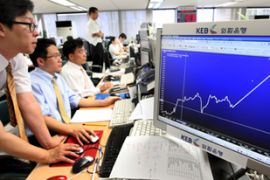Asian giants hold first summit
Japan, South Korea and China discuss global financial crisis at trilateral talks.

Economic co-operation
In the run-up to the summit, Aso met Lee Myung-bak, South Korea’s president, and agreed that the countries would work together to tackle the fallout from the global economic downturn.
“The two leaders agreed to closely co-operate in having follow-up efforts implemented to those made under the [recent] G20 financial summit meeting,” the South Korean presidential office said in a statement.
Japan said on Friday that it will boost its existing stimulus plans and increase its reserve fund for bank rescues to $131bn.
But the package may not be enough to tackle the recession in Japan, Jan Friederich, a senior economist with the Economist Intelligence Unit, told Al Jazeera.
“I think the additional stimulus that Japan has announced is not really that strong. Japan has a very large public debt burden and therefore is quite reluctant to increase that burden much more. It is really not enough to prevent the economy from further recession.
Tokyo has not said whether it will act to stop a surging yen from pushing the Japanese economy deeper into recession.
Stimulus plan
China, which is also facing a slowdown of its hitherto surging economy, on Wednesday said it will boost public spending and cut taxes.
Beijing has already launched a four trillion yuan ($586 billion) stimulus plan but Liu Mingkang, China’s senior banking regulator, said on Saturday that the country may experience outflows of capital and could face deflation.
South Korea has this year committed $130bn to prop up its banking system and another $25 billion in fiscal spending and tax cut plans to stave off a recession.
While the issue of the global financial crisis is likely to dominate the summit, the Northeast Asian nations are also discussing territorial matters.
Aso told the Chinese prime minister that Japan was concerned by the entry of Chinese boats into waters near disputed southern islands known as the Senkaku in Japanese and the Diaoyu in Chinese, a Japanese official said.
Wen said that the territory belonged to China but said that dialogue would solve the issue.
Tokyo had protested to Beijing on Monday after the ships spent nine hours near the islands, which are claimed by Japan, China and Taiwan.
Territorial dispute
South Korea and Japan are also in dispute over a group of islets which lie near fertile fishing grounds and possible maritime deposits of natural gas.
However, the subject of Japan’s pre-1945 colonisation of Korea and its aggression on the Asian mainland in the first half of the last century have not made the summit agenda.
Seoul is also keen that the summit will cement a $50bn currency swap deal with Japan and China, which was reached on Friday.
Out of the three North Asian economies, South Korea has been hit hardest by the global financial crisis, with the country’s central bank saying that the country is set for its slowest growth in over a decade.
Although the three North Asian leaders are expected to issue a statement committing them to stimulate their economies they are not likely to unveil a tailored stimulus plan, a Japanese official said before the currency swap deal was reached.